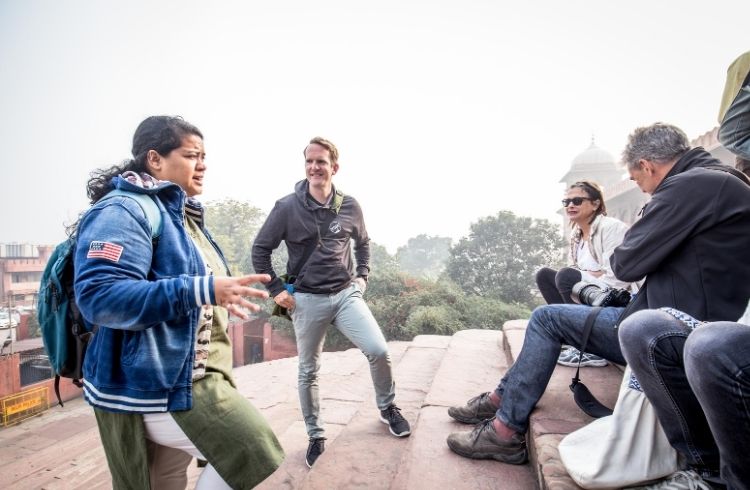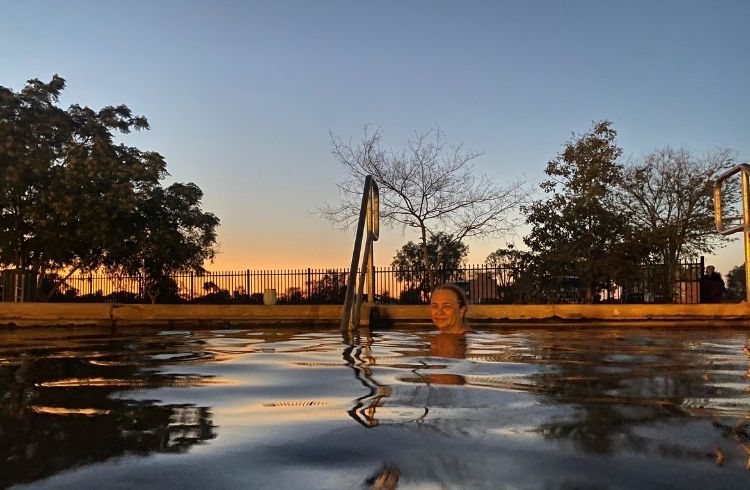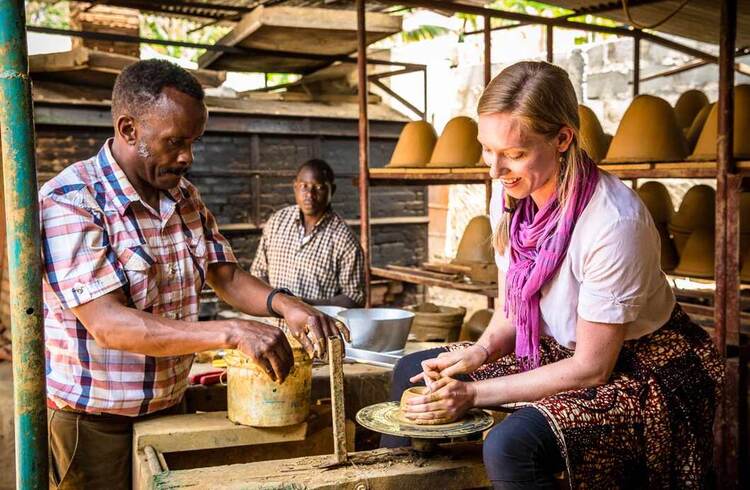In this episode, we hear about Intrepid's guide to help businesses decarbonize as more travelers choose companies that align with their personal values.
.jpg) Photo © Kijabe Forest Offsetting Project
Photo © Kijabe Forest Offsetting Project
Listen Now
The World Nomads Podcast: Traveling during COVID-19
With COVID-19 still affecting the way we engage with the world, it’s important to plan wisely and travel responsibly, both for your own safety and that of the places you visit. But as we reengage with the world, you're likely planning vacations not far from home. World Nomads can help by providing travel safety tips, inspiring content, and travel insurance designed to protect you while traveling.
Before you buy a travel insurance policy, check your government travel warnings and health advice – there may be no travel insurance cover for locations with a government travel ban or health advice against travel.
What’s in the episode
00:19 Where is Phil?
00:54 Intrepid’s free resource
03:10 Tips for being carbon neutral
04:43 A Holiday should be a holiday
06:04 What travelers want
08:09 The Ten Step Guide
10:50 Kim’s great question
12:21 Where does James want to travel to?
Quotes from the episode
“…more and more people now want to choose brands that align with their personal values and that doesn't only apply in travel, but we can see the rise of sustainable brands in other industries too, thinking of industries like fashion, or food, or cosmetics.” - James
Who is in the episode
James Thornton is the first non-founding Chief Executive Officer of the Intrepid Group, a portfolio of leading travel brands that are globally recognized as a leader in responsible travel. Taking over 250,000 travelers to more than 100 countries on all seven continents, the Intrepid Group is the world’s largest provider of adventure travel experiences and the only vertically integrated business in the fast-growing adventure travel sector.


Kim and her husband are loosely following The Great Artesian Basin and its springs along the Barka (Darling River) in Australia. The basin is the biggest and deepest in the world. The water temperature in the various springs dotted along the route average 40 degrees and is raised by heat radiating from Earth’s molten core. It’s claimed the springs have therapeutic and healing properties.
Resources & links
Download A 10-Step Quick Start Guide to Decarbonise Your Travel Business.
Intrepid’s recent Daintree Retreat.
Download World Nomads free guide and learn how to be a more responsible traveler.
You can get in touch with us by emailing podcast@worldnomads.com.
Help us spread the word
We’d love it if you could please share #TheWorldNomadsTravelPodcast with your twitter followers and head over to Facebook and join the World Nomads Travel Podcast group.
If you liked this episode please head to Apple Podcasts and kindly leave us a rating, review, and of course, subscribe so you don’t miss an episode.
We use the Rodecaster Pro to record our episodes and interviews when in the studio, made possible with the kind support of Rode.
Kim: Hi it’s Kim with you flying solo this episode with Phil on a break. Although while I am not on holiday I am working on the road with my husband from our van and recording this episode in Lightning Ridge, a small outback town in north-western New South Wales, in Australia and I am going to be catching up via Zoom with James Thornton, the CEO of responsible tour operator Intrepid Travel.
Intrepid has been a carbon-neutral business since 2010 and has created a 10-Step Quick Start Guide to Decarbonise Your Travel Business.
It’s a free resource providing an easy-to-follow action plan on reduction and offsetting for tourism businesses, to encourage the industry to rebuild more sustainably amid the pandemic. And that is something travelers want to support moving through coronavirus.
James: ... I think so. Yeah. I mean, we've got this unique opportunity whereby the world has been kept at home and had to stand still. And we've got this opportunity to try and rebuild more responsibly. And the brutal reality in a pre-COVID environment was, unfortunately, some of our travel actions were having a negative impact on the thing that we ultimately treasure so much, which is the world. And if we continue to head in that direction, then we were facing irreversible climate change. And would ultimately face an even worse disaster for the travel industry in 20 to 30 years' time. So, we do now have this unique opportunity where we've been kept at home to try and rebuild more responsibly and to make sure that our future travel plans can benefit, local communities, the environment, travelers, all stakeholders as much as possible. But it does require us to change and adapt the way in which we travel moving forward.
Kim: Well, Intrepid is in a really good position to not preach, but you guys are carbon neutral and had worked towards that for a few years. So, what are some tips that you could give companies, or travelers?
James: Yeah. So, Intrepid has been a carbon-neutral business since 2010, that journey started for us in 2005. Our founders encourage our leadership team to read Tim Flannery's book, The Weather Makers, a few of us did Al Gore's climate change training. And so being a carbon neutral business has been fantastic. But, for us a company, it's probably no longer enough to just neutralize the impacts of the carbon that we omit, we actually have to take active steps to reduce the carbon that we omit. So, Intrepid is on the verge of committing to science-based targets to reduce its overall emissions in line with the Paris Agreement. In terms of what other companies can do? The key thing is just to start small, you don't go from being ... Intrepid's been a responsible travel leader for 31 years.
And we've been on our climate journey for 15 years. So, it's very hard to replicate 15 years of work in a few months. So start small, start with something you're passionate about. Intrepid has just released its 10 step quick start guide to decarbonizing your travel business, which is a free guide. You can go and download from our website, was created by our own environmental impact specialist. And it's a low barrier way for other travel companies to get started on their carbon journey, by offering straightforward steps. So, that's what I encourage companies to do, is by starting small. For individuals, I think it's just by really carefully researching the type of travel you do. When you're traveling to a destination, try not to take multiple different flights in the destination, trying to use more local transport than privately chartered transport, try and support local hotels rather than chain hotels, trying to eat the local food, again rather than eating in chain restaurants. So, I think they're all steps that both companies and individuals can take.
Kim: We'll put a link to those 10 steps in show notes, but I've interviewed Darrell Wade, one of the co-founders of Intrepid who said that "When it boils down, our travelers are going on a holiday, they don't want to be burdened with guilt, or burdened with worthy acts." So, I think he summed it up with, "You don't want to be hit on the head with all these rules that you have to abide by."
James: That's right. Yeah.
Kim: How do you achieve a balance?
James: Yeah, absolutely. It's absolutely true. The holiday should be a holiday, but more and more people now want to choose brands that align with their personal values and that doesn't only apply in travel, but we can see the rise of sustainable brands in other industries too, thinking of industries like fashion, or food, or cosmetics. And so traveling with a sustainable tour operator, for me, I think it means feeling good about your purchase and knowing that your holiday isn't causing detrimental harm to local people, or the environment. So, on an Intrepid trip, you'll expect to eat in local restaurants, to take public transport, to meet with local people. And we believe it's a style to travel that's not only better for the world, but it also helps create authentic real-life experiences for our travelers. So, I think there's a way of ultimately doing it where you can meet everyone's objectives without sounding too preachy.
Kim: Yeah. So it's that balance, isn't it? So, how are consumers making more conscious travel choices when it comes to not only safety, which is going to be really the way forward, isn't it? To think not only sustainably, but how to travel safely? What thoughts do you have on that?
James: So, safety is absolutely going to be a primary concern for travelers. We are seeing that the travelers are all sending customer surveys that we're doing at the moment ... Customers have real intention to travel again, but they want to make sure that it's safe and secure to be able to do. So, cleanliness standards are going to have to be increased. One of the things Intrepid has done is to spend time working with the World Travel and Tourism Council and adopting their Safe Travel mark. So, WTTC has outlined a series of steps that travel companies need to be taking in order to get their Safe Travel mark. And that's what Intrepid has gone and adopted. So, we've already operated three trips in a post-COVID environment. Three doesn't sound too many, given that we would have been operating hundreds of trips a week in a pre-COVID environment.
But post-COVID, we've operated three trips and those trips have taken a lot of energy and time of both our people to design them and make sure that they're safe and secure and the touchpoints that have to happen on the trips, in terms of the dealings with the hotels and the transport companies, and even going through immigrations and the like are much more intensive than they were. But ultimately our travelers have told us that they felt safe and secure, that they're still able to have some fantastic experiences, and are keen to spread the word and start to come back. So, it is going to be very different when travel starts to return on a more material level, but ultimately safety is going to be a number one concern initially.
Kim: Yeah. I'm doing some research on a travel writer that I'm going to be chatting to, Laura Waters, who's written the book Bewildered, which was incredible. But I noticed as part of that research, I think she went on one of the Intrepid trips in Northern Territory, am I right?
James: Yeah. It's up in the Daintree. Yes, in the Daintree.
Kim: So, I haven't got to reading that article yet, but will look forward to doing that and also sharing it in show notes, James.
James: Yes. Fantastic.
Kim: With the 10 steps guide, how does that aim to future-proof the industry? If we can just pull that apart a little more and how the sector can rebound stronger than it was before if it rebuilds in that more responsible way?
James: Yeah. So the 10 step guide, as I said, it was created by our environmental impact specialist and she did it to create a low barrier way for other travel companies to get started. I don't know about you, but when I think of things like AI, I think goodness how would we even start, getting AI into the Intrepid business? And I think for many travel companies, they think of that when it comes to climate, their intention is that they want to do good, but they're just not quite sure how to do it. So, we have created some straightforward steps for companies to understand for example, how that climate change is impacting their business, to actually fully developing a climate management strategy. And what we've tried to do is use real-world examples from Intrepid to show how other companies can go and implement similar strategies within their own organization.
So, we've done it not just with carbon. We've also released a similar one, an animal welfare policy toolkit too. So, just ultimately we're trying to ... If we're going to talk about rebuilding responsibly, we feel that we've actually got to take a leadership position in helping support others be able to do that. And that's why we've gone ahead and released these two quick start guides. I think that travel is no longer a ... It's not a right anymore. It's a privilege. And I think customers will take a more thoughtful approach to travel, moving forward. And I think there'll be a focus on the outdoors, on active holidays, on iconic bucket list trips with sustainability at the fronts of mind. We are seeing demand for bookings into 2021 with people wanting to fulfill that once a lifetime trips. And we are seeing a shift towards growth in sustainable travel and customers wanting to book travel companies that are ultimately doing the right thing for the planet and its communities.
It is no coincidence that Intrepid over the course of the last four years has doubled its revenue. We are seeing this transformational shift of people moving away from more traditional tour operators on some more sustainable travel experiences. So, companies like Intrepid, we are able to provide these kinds of fantastic experiences. The transformational events is canals and sea turtles thriving in Thailand. And the worldwide shut down from the pandemic has really shone a light on tourism impacts when it's at full force. And people wanting to be sure that their future travel decisions are responsible and hopefully don't bring any more harm to the places that they're ultimately going to visit.
Kim: We're going to live with this. How, and when do we start moving forward through COVID, there's not going to be a post-COVID. How do we travel through this?
James: Yeah. Look it's a great question, Kim. And if you think down here in Australia at the moment, Melbourne is rightly, kind of extremity. I suppose it's a response in terms of ... I think our government is saying that they are trying to suppress the virus, really the strategy that's being put in place, is to try and eliminate it. Our borders have up until recently been pretty locked internationally and locked domestically. And what we have to do is to encourage our politicians to move beyond politics, which is very difficult for them to do and to actually think in the best interests of all stakeholders again like we're trying to do Intrepid is certified, B Corp.
And try and get movement happening between borders, where it is contained or suppression of the virus. And start to get people moving and then to respond to isolated cases quickly through strong contract tracing. And proof that we can find a way. We have seen Brits and Europeans doing its travel over the last few months and there are concerns now that some of that's led to a second wave. But then you see other positive cases, don't you, in a country like Iceland, where you went to the country, you do a COVID test, five days in isolation, do a second COVID test, and then you're released and you good to go. So, we do live in a globalized world and that will have to return at some point.
Kim: You've had a lot of time to think, where's the first place you want to visit James?
James: Oh, goodness me, at the moment I'd go to the Mornington Peninsula, Kim to be honest. But no, look I'm English, and I've been very fortunate over my 13 years at Intrepid living in Australia that I can get home and see family and friends anytime I want to. And that opportunity has been taken away from me. And so as soon as I can, I'll want to head back to England and see my family and friends to be honest. It's those simple, small things that we used to so often take for granted, that's unfortunately become much more appreciative of when you're without it.
Kim: Thank you so much James, a link to the guide is in show notes. Thanks for tuning in to this episode and a reminder to rate, share and subscribe so the world hears about our episodes. Next week, travelers are returning to Guatemala and we’ll let you know how to visit as the 2020 pandemic continues.
Related articles
Simple and flexible travel insurance
You can buy at home or while traveling, and claim online from anywhere in the world. With 150+ adventure activities covered and 24/7 emergency assistance.
Get a quote


No Comments